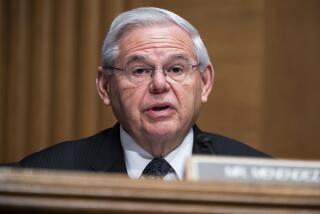Nunn Reported Moving to Curb Reagan’s Gulf Plan
- Share via
WASHINGTON — Senate Armed Services Committee Chairman Sam Nunn (D-Ga.) has drafted a proposal that would put congressional restrictions on President Reagan’s controversial plan to provide U.S. military protection for Kuwaiti oil tankers in the Persian Gulf, congressional sources said Monday.
Nunn, who has warned that the Reagan plan lacks broad public support and could involve the United States in the Iran-Iraq War, plans to discuss his proposal today at a special meeting called by Democratic leaders in Congress. Details of Nunn’s proposal have not been disclosed.
The senator, reached in Atlanta where he was speaking at a Democratic Party meeting on the 1988 election, declined to comment. Nunn, regarded as the most authoritative member of the Senate on military matters, has been widely mentioned as a possible Democratic candidate for President.
Kuwaiti Tankers Reflagged
The Administration’s escort plan, under which 11 Kuwaiti tankers will be re-registered to fly the American flag, is designed to underscore U.S. determination to keep open international shipping lanes used to carry oil from the petroleum-rich gulf. Opposition to the policy mushroomed after the May 17 Iraqi attack on the Navy frigate Stark, which killed 37 U.S. sailors.
During his speech, Nunn urged that the reflagging of the Kuwaiti tankers, expected next month, be delayed and warned that the policy could draw the United States into the Persian Gulf War, which has raged for nearly seven years. “The people need to know what we’re doing there and why,” Nunn said.
The senator called Reagan’s plan “a poor display of foreign policy decision-making” and said “it is not explainable and not understandable.”
Sen. David L. Boren (D-Okla.), who first told reporters of the Nunn proposal during a luncheon interview here, referred to it as a “compromise.” While Reagan’s plan is “very dangerous,” Boren said, Democrats favor a compromise because totally backing off the President’s commitment would “kill” American credibility in the Middle East.
Review of Policy Urged
Boren, chairman of the Senate Intelligence Committee and a member of the Senate panel investigating the Iran- contra scandal, also said that Congress should examine the “major impact” U.S. sales of arms to Iran have had on American policy in the gulf.
He told reporters that the Administration’s decision to sell weapons to Tehran as part of its efforts to secure the release of American hostages in the Middle East “spilled over into our policy in the Persian Gulf.”
Declaring that “we are now paying a price for the Iranian arms sale,” he pointed out that Kuwait made overtures to the Soviet Union involving protection of its tankers immediately after disclosure that the United States had supplied arms to Iran. The vessels have been repeatedly attacked by Iran because of Kuwait’s ties to Iraq.
He said that Kuwait and other Persian Gulf states were “terrorized by Iran” and, when they believed that America was tilting toward Iran in the gulf war, began looking elsewhere for help.
More to Read
Get the L.A. Times Politics newsletter
Deeply reported insights into legislation, politics and policy from Sacramento, Washington and beyond. In your inbox twice per week.
You may occasionally receive promotional content from the Los Angeles Times.










